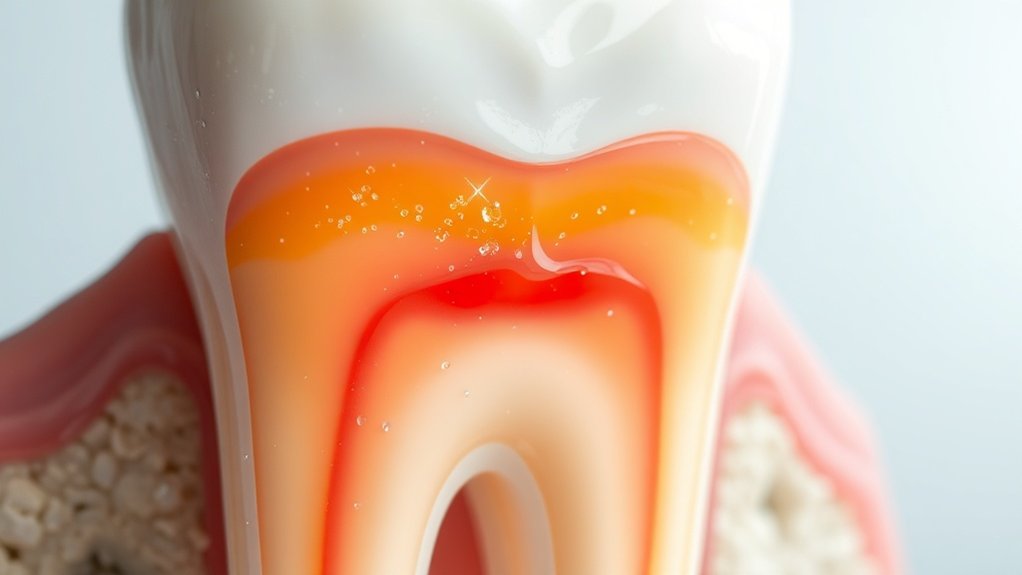Dicalcium phosphate (DCP) in Prodentim boosts your tooth strength and reduces sensitivity by facilitating enamel remineralization. It enhances mineral delivery to your tooth structure, promoting increased enamel density and decay resistance. DCP’s ability to reinforce enamel protects against external factors, alleviating discomfort from temperature changes and sugary foods. Regular use of Prodentim supports not just stronger teeth but also overall oral health. There’s more to discover about how DCP contributes to your dental wellness journey.
Key Takeaways
- Dicalcium phosphate in Prodentim strengthens tooth enamel by enhancing its density, making it more resistant to decay and wear.
- It promotes remineralization, helping to restore lost minerals in weakened areas of enamel, reducing sensitivity over time.
- By aiding in the absorption of calcium and phosphate ions, DCP reinforces the tooth surface against external temperatures and sugary foods.
- Regular use of Prodentim contributes to improved oral comfort and health, alleviating discomfort associated with sensitive teeth.
- DCP’s sustained mineral release supports overall tooth integrity, reinforcing enamel and enhancing decay resistance effectively.
What Is Dicalcium Phosphate?
Dicalcium phosphate, often abbreviated as DCP, is a calcium phosphate compound that plays an essential role in various applications, including dental health products like Prodentim. It’s composed of two calcium ions and one phosphate ion, making it a significant source of minerals fundamental for maintaining strong teeth and bones. DCP’s unique composition allows it to effectively bind to and deliver calcium and phosphate to oral tissues, promoting remineralization. This process is critical for reversing early signs of tooth decay and enhancing overall oral health. Additionally, dicalcium phosphate‘s low solubility in water means it can provide a sustained release of minerals, ensuring that your teeth receive ongoing support. Understanding DCP’s properties helps you appreciate its benefits in oral care products.
The Role of Dicalcium Phosphate in Oral Health
Dicalcium phosphate plays an essential role in oral health by strengthening tooth enamel and alleviating sensitivity issues. Its calcium and phosphate content helps remineralize enamel, making it more resistant to decay. Additionally, it provides relief for those experiencing tooth sensitivity by promoting a healthier oral environment.
Strengthening Tooth Enamel
When it comes to maintaining strong tooth enamel, the inclusion of dicalcium phosphate in oral care products plays an essential role. This mineral aids in enamel remineralization, which is vital for protecting your teeth against decay and sensitivity. By utilizing dental supplements containing dicalcium phosphate, you can greatly enhance your oral health.
- Promotes the restoration of lost minerals in enamel
- Reduces the risk of cavities and tooth sensitivity
- Supports overall tooth strength and stability
Incorporating dicalcium phosphate into your oral care routine not only strengthens enamel but also improves your teeth’s resilience against everyday wear and tear. This proactive approach to oral health can lead to long-term benefits and a brighter, healthier smile.
Alleviating Sensitivity Issues
To tackle sensitivity issues effectively, incorporating dicalcium phosphate into your oral care routine can make a significant difference. This compound not only provides sensitivity relief but also reinforces enamel, helping to protect against external stimuli that cause discomfort. Research indicates that dicalcium phosphate aids in remineralizing enamel, which is vital for preventing tooth decay. By enhancing the mineral content of your teeth, it creates a stronger barrier against acids and bacteria. As a result, you’re less likely to experience pain triggered by hot or cold foods. Regular use of products containing dicalcium phosphate guarantees ongoing enamel reinforcement, supporting long-term oral health and reducing sensitivity effectively. Consider integrating these benefits for a more comfortable dental experience.
How Dicalcium Phosphate Strengthens Tooth Enamel
Dicalcium phosphate plays an essential role in the mineralization process of your tooth enamel, enhancing its strength and resilience. By facilitating the remineralization of enamel, it helps to reverse early signs of decay and maintain oral health. Understanding how this compound contributes to enamel integrity can empower you to make informed choices about your dental care.
Mineralization Process Explained
While many factors contribute to oral health, understanding how dicalcium phosphate facilitates the mineralization process reveals its critical role in strengthening tooth enamel. This compound acts as a source of calcium phosphate, essential for enhancing tooth strength. When incorporated into your dental care routine, dicalcium phosphate helps remineralize enamel, making it more resistant to decay.
- It increases calcium and phosphate levels in saliva.
- It promotes the formation of hydroxyapatite, a key mineral in enamel.
- It reduces tooth sensitivity by fortifying enamel structure.
Enhancing Remineralization Benefits
As you incorporate dicalcium phosphate into your dental care routine, you’ll notice its significant contributions to the remineralization of tooth enamel. This compound actively enhances minerals absorption, ensuring that essential nutrients reach your teeth effectively. Research shows that dicalcium phosphate plays an important role in strengthening enamel, which in turn protects the underlying dentin. The remineralization benefits are profound; by replenishing lost minerals, it not only prevents decay but also reduces tooth sensitivity. As enamel becomes stronger, you’ll experience enhanced protection against acidic foods and beverages, minimizing discomfort. Overall, dicalcium phosphate serves as a proactive agent in maintaining ideal oral health, ensuring that your teeth remain resilient and robust against daily challenges.
Reducing Tooth Sensitivity With Dicalcium Phosphate
Tooth sensitivity can be a frustrating issue, but incorporating dicalcium phosphate into your dental care routine may offer a solution. This compound enhances enamel density, which helps strengthen tooth structure and reduces sensitivity over time. By using products containing dicalcium phosphate, you can experience the following benefits:
- Improved enamel strength, leading to less discomfort.
- Enhanced remineralization of weakened areas, promoting overall tooth health.
- Protection against external stimuli, such as temperature changes and sugary foods.
Research indicates that dicalcium phosphate works by facilitating the absorption of calcium and phosphate ions, essential for developing resilient enamel. So, if you’re struggling with tooth sensitivity, consider dicalcium phosphate as a strategic addition to your oral care regimen.
The Benefits of Including Dicalcium Phosphate in Your Diet
Including dicalcium phosphate in your diet can greatly enhance your overall health, particularly in supporting dental and bone integrity. This mineral plays an essential role in maintaining your teeth’s strength and structure, providing effective teeth protection against decay and erosion. Research shows that dicalcium phosphate aids in the remineralization of enamel, promoting oral wellness by reducing the risk of cavities. Additionally, it helps to balance calcium and phosphorus levels in your body, which is crucial for bone health. By incorporating foods rich in dicalcium phosphate, such as dairy products and certain cereals, you can markedly improve your oral hygiene and overall health. Making this simple dietary change can lead to long-lasting benefits for your teeth and bones.
How Prodentim Utilizes Dicalcium Phosphate for Dental Care
While many dental products focus solely on surface cleaning, Prodentim strategically incorporates dicalcium phosphate to enhance oral health on a deeper level. This ingredient plays a vital role in enamel defense, ensuring your teeth are fortified against decay and sensitivity.
Here’s how dicalcium phosphate benefits your dental care:
- Strengthens enamel: It promotes remineralization, making your teeth more resilient.
- Supports cavity prevention: By neutralizing acids, it reduces the risk of cavities forming.
- Reduces sensitivity: Dicalcium phosphate helps alleviate discomfort by reinforcing enamel and protecting nerve endings.
Scientific Studies Supporting the Use of Dicalcium Phosphate
Given the growing interest in effective dental care ingredients, numerous scientific studies have validated the benefits of dicalcium phosphate for oral health. Research indicates that dicalcium phosphate enhances enamel remineralization, effectively reinforcing tooth structure. In a study published in the *Journal of Dental Research*, the incorporation of dicalcium phosphate showed a significant increase in decay resistance, reducing the risk of cavities. Its ability to bind to enamel allows for improved calcium and phosphate ion delivery, vital for maintaining tooth integrity. Additionally, a meta-analysis highlighted dicalcium phosphate’s role in alleviating tooth sensitivity by promoting enamel health. These findings underscore how dicalcium phosphate is not just beneficial, but indispensable in modern dental care formulations like Prodentim for peak oral health.
Incorporating Prodentim Into Your Dental Routine
Integrating Prodentim into your daily dental routine can greatly enhance your oral health, especially with its key ingredient, dicalcium phosphate. By incorporating Prodentim, you’re not only supporting your tooth strength but also promoting overall gum health. Here’s how you can easily include it in your regimen:
- Use it daily: Make Prodentim a part of your morning and evening oral hygiene routine.
- Pair with brushing: Use Prodentim alongside your toothbrush for best results.
- Monitor your progress: Keep track of your gum health and tooth sensitivity to see the benefits over time.
With consistent use, Prodentim can lead to healthier gums and improved oral hygiene, making your smile stronger and more resilient.
Frequently Asked Questions
Can Dicalcium Phosphate Cause Any Allergic Reactions?
Yes, dicalcium phosphate can cause allergic reactions in some individuals, though it’s rare. If you experience symptoms like itching, swelling, or difficulty breathing after exposure, seek medical advice to guarantee your safety and well-being.
Is Dicalcium Phosphate Safe for Children?
Yes, dicalcium phosphate is generally safe for children when used appropriately. It’s commonly found in dental products and supplements, but you should consult with a pediatrician before introducing any new substance to their routine.
How Does Dicalcium Phosphate Compare to Fluoride?
Dicalcium phosphate strengthens teeth similarly to fluoride but lacks fluoride’s proven cavity prevention. While both compounds promote oral health, dicalcium phosphate’s benefits in remineralization are significant, yet fluoride remains the gold standard in decay prevention.
Can Dicalcium Phosphate Help With Bad Breath?
Yes, dicalcium phosphate can help with bad breath. It works by neutralizing acids and promoting a healthier oral environment, which reduces bacteria responsible for unpleasant odors, thereby improving your overall breath freshness.
What Are the Sources of Dicalcium Phosphate in Nature?
You’ll find dicalcium phosphate in natural sources like bones, teeth, and certain minerals. It’s also derived from animal bones and can be synthesized through chemical processes, making it accessible for various applications in health and nutrition.
Conclusion
Incorporating dicalcium phosphate into your dental care routine—like with Prodentim—can considerably enhance your oral health. Studies show that dicalcium phosphate can increase tooth enamel hardness by up to 20%, making your teeth more resilient. Additionally, it effectively reduces sensitivity, allowing you to enjoy hot and cold foods without discomfort. By prioritizing this mineral, you’re not just strengthening your teeth; you’re investing in long-term dental health for a brighter, more confident smile.





